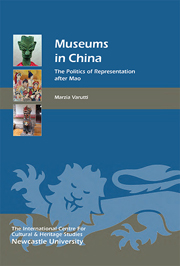Book contents
- Frontmatter
- Contents
- List of Illustrations
- Acknowledgments
- Chronology
- List of Abbreviations
- Introduction
- 1 Cultural Heritage in China
- 2 Museums in China: origins and Development
- 3 New Actors in the Chinese Museum World
- 4 Museum objects and the Chinese nation
- 5 The nation in the Museum
- 6 The Politics of the Past
- 7 The Representation of the Past in China's Museums
- 8 The Politics of identity
- 9 The Museum Representation of ethnic Minorities
- 10 Techniques and sites of Display of ethnic Minorities
- Conclusions: The new Museums of China
- Appendix: List of Museums in China Visited by the Author
- Bibliography and References
- Index
- Heritage Matters
Conclusions: The new Museums of China
Published online by Cambridge University Press: 05 March 2014
- Frontmatter
- Contents
- List of Illustrations
- Acknowledgments
- Chronology
- List of Abbreviations
- Introduction
- 1 Cultural Heritage in China
- 2 Museums in China: origins and Development
- 3 New Actors in the Chinese Museum World
- 4 Museum objects and the Chinese nation
- 5 The nation in the Museum
- 6 The Politics of the Past
- 7 The Representation of the Past in China's Museums
- 8 The Politics of identity
- 9 The Museum Representation of ethnic Minorities
- 10 Techniques and sites of Display of ethnic Minorities
- Conclusions: The new Museums of China
- Appendix: List of Museums in China Visited by the Author
- Bibliography and References
- Index
- Heritage Matters
Summary
Throughout Chinese history, the meanings and values attributed to cultural heritage have reflected the stability and the transformations, the weaknesses and the virtues deployed in the exercising of authority. Since the 19th century, Chinese museums have provided not only a framework for the viewing, appreciation and interpretation of cultural heritage, but also a setting for the representation of contrasting narratives of the past and present of the Chinese nation.
In China, perhaps more than anywhere else, museums have played a crucial role in rooting political authority, instilling a sense of unity, creating a common identity and developing images of the national self. Post-1949, museums became key institutions in the process of nation-building, of which the Communist Party was the sole architect. Museums' contents, forms, objectives and priorities were (re)designed to fulfil the requirements of the new ideology. Providing ‘political education’ was the primary function of museums.
At the outset of the new millennium, against the backdrop of what Kirk Denton (2005, 565) has called the ‘ideology of market reform’, China's socio-economic evolution is transforming the profile of the country, impacting on virtually every aspect of social life: social relations, living standards, working life, education, leisure activities, mobility, health and the environment, to mention just a few. In such a volatile, complex context, it is perhaps not so strange that the Chinese government is again turning its attention to museums.
- Type
- Chapter
- Information
- Museums in ChinaThe Politics of Representation after Mao, pp. 159 - 164Publisher: Boydell & BrewerPrint publication year: 2014



